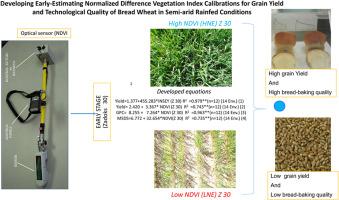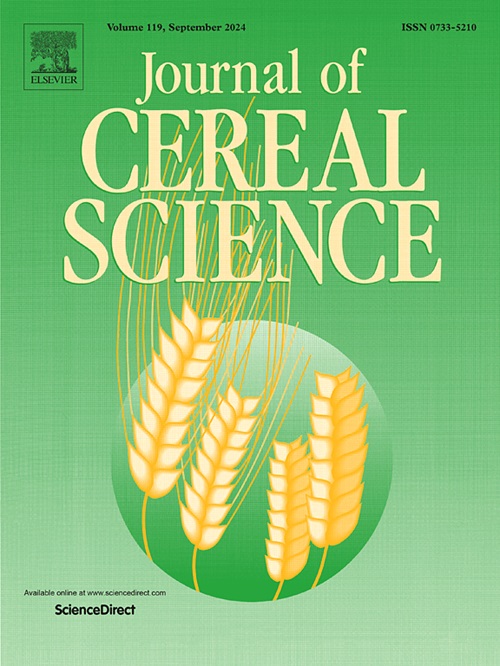Developing early-estimating normalized difference vegetation index calibrations for grain yield and technological quality of bread wheat in semi-arid rainfed conditions
IF 3.9
2区 农林科学
Q2 FOOD SCIENCE & TECHNOLOGY
引用次数: 0
Abstract
In this study, the usability of in-season estimated yield (INSEY) and optical-read sensor Normalized Difference Vegetation Index (NDVI) at the Zadoks30 stage (Z 30) in rainfed conditions for predicting bread wheat grain yield and technological quality was evaluated. Data from nitrogen fertilizer application field trials conducted in eight consecutive years in 14 environments were used to develop regression equations to predict yield and some quality attributes in rainfed conditions. The trials were divided into two groups, low NDVI (LNE) and high NDVI (HNE), according to the magnitude of NDVI. Technological bread quality parameters and yield were higher in the HNE. The increase in grain protein content (GPC) and macro SDS (MSDS) sedimentation against nitrogen rates became significant beyond 60 kg N ha−1 in the LNE and 30 kg N ha−1 in the HNE. Linear relationships occurred between NDVI and observed values of grain yield (R2 = 0.743, p<0.001) and GPC (R2 = 0.963, p<0.001). The use of NDVI and INSEY values at Z 30 stage facilitated the development of equations capable of predicting grain yield, GPC, and gluten quality. The developed equations can be used in the nitrogen fertilization strategy during the tillering stage to achieve specific yield and protein.

为半干旱雨养条件下面包小麦的谷物产量和技术质量开发早期估计归一化差异植被指数定标
本研究评估了雨养条件下扎多克30阶段(Z 30)的当季估计产量(INSEY)和光学读数传感器归一化植被指数(NDVI)在预测面包小麦谷物产量和技术质量方面的可用性。利用连续八年在 14 个环境中进行的氮肥施用田间试验数据,建立了回归方程,以预测雨养条件下的产量和一些质量属性。根据 NDVI 的大小,试验被分为低 NDVI (LNE) 和高 NDVI (HNE) 两组。高NDVI组的技术面包质量参数和产量更高。LNE 和 HNE 的谷物蛋白质含量(GPC)和宏观 SDS(MSDS)沉降率在氮含量超过 60 千克/公顷-1 和 30 千克/公顷-1 时显著增加。NDVI 与谷物产量观测值(R2 = 0.743,p<0.001)和 GPC(R2 = 0.963,p<0.001)之间存在线性关系。使用 Z 30 阶段的 NDVI 和 INSEY 值有助于建立能够预测谷物产量、GPC 和面筋质量的方程。所建立的方程可用于分蘖期的氮肥施用策略,以获得特定的产量和蛋白质。
本文章由计算机程序翻译,如有差异,请以英文原文为准。
求助全文
约1分钟内获得全文
求助全文
来源期刊

Journal of Cereal Science
工程技术-食品科技
CiteScore
7.80
自引率
2.60%
发文量
163
审稿时长
38 days
期刊介绍:
The Journal of Cereal Science was established in 1983 to provide an International forum for the publication of original research papers of high standing covering all aspects of cereal science related to the functional and nutritional quality of cereal grains (true cereals - members of the Poaceae family and starchy pseudocereals - members of the Amaranthaceae, Chenopodiaceae and Polygonaceae families) and their products, in relation to the cereals used. The journal also publishes concise and critical review articles appraising the status and future directions of specific areas of cereal science and short communications that present news of important advances in research. The journal aims at topicality and at providing comprehensive coverage of progress in the field.
 求助内容:
求助内容: 应助结果提醒方式:
应助结果提醒方式:


